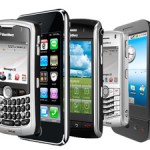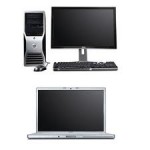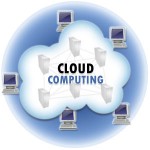IS THE “NEW” iPAD FOR YOU?
 The big news in the tech world this past week has been the launch of the “New” iPad. This third generation iPad has received a great deal of press both before and after the launch.
The big news in the tech world this past week has been the launch of the “New” iPad. This third generation iPad has received a great deal of press both before and after the launch.
The first question you must ask yourself is whether or not a tablet is for you. The iPad is still the number one ranked and best selling tablet. If you already own one, then you must evaluate the merits of upgrading to the “latest and greatest.” For those of you who have never owned one, the major issue is to determine whether a tablet will address your technology needs, whether for personal or professional purposes.
As indicated in previous posts, the tablet has proven to be an ideal substitute to the much heavier laptop computer for the road warrior. Tablets are excellent for communication (email, messaging, skype, etc) and getting information (news, weather, restaurants, movies, games, etc). For those of you that do a lot of writing, there are many keyboards on the market that make typing much easier than the touch pad. However, despite publicity to the contrary, it does not replace a computer since there are many functions that require a computer.
During the past few months, I have introduced the iPad to several clients who have never used a computer. Tablets have proven to be the ideal solution to techno-phobics who had previously been reluctant to embrace technology. The larger screen and easy access to “apps” has changed their world.
If you have been considering your first tablet purchase, take some time to sit down and write down your technology needs. There are many options to choose from, the iPad, Nook, Kindle, etc.
As for those of you considering an upgrade, the new iPad offers a faster processor, high resolution screen, 4G wireless service, and a far better camera than the earlier models.
However, like many new products, there are several issues that have surfaced that must be considered before you decide to upgrade.
The iPad offers two ways of accessing the Internet. The popular choice is the faster wireless 4G network, at this time provided by both Verizon and AT&T. The monthly charge for this service is based on the amount of data used. The other, and free method, is any wi-fi network, such as set up in your home, hotels, some airports and coffee shops (Starbucks). Try steaming movies through the 4G wireless network and you will find that your data costs will skyrocket. An article in today’s Wall Street Journal, http://on.wsj.com/GBIDcO, offers a full explanation of what to expect if you use the 4G wireless network and the costs associated with it.
Other reports indicate the new iPad might have a overheating issue, which Apple is looking into.
If you need help determining whether the new iPad is for you as a new purchase or whether you should consider the upgrade, do not hesitate to contact me at 917 921-4518 or by e-mail at jblue@bluetutor.com. Feel free to click here to receive my free white paper on Technology Tips on setting up a home office and becoming a true road warrior.
PLANNING A NEW CAREER IN THE NEW YEAR?
 How long have you been thinking about a career change? Is 2012 the year you will finally act and follow your gut? Whether you are stuck in an unrewarding job or just burned out, you are not alone.
How long have you been thinking about a career change? Is 2012 the year you will finally act and follow your gut? Whether you are stuck in an unrewarding job or just burned out, you are not alone.
Below is a link to an article that appeared in the Wall Street Journal containing portraits of several people who found a “second act” rewarding.
Do you need to brush up on your basic computer skills, require help choosing the right computer or any other technology issues, do not hesitate to contact me at 917 921-4518 or by e-mail at jblue@bluetutor.com.
PLANNING TO RE-ENTER THE JOB MARKET?
 According to a recent article in US News and World Report, http://bit.ly/v0IlW6, about 9 percent of all people ages 44 to 70, are already in encore careers, up from 8.4 million in 2008.
According to a recent article in US News and World Report, http://bit.ly/v0IlW6, about 9 percent of all people ages 44 to 70, are already in encore careers, up from 8.4 million in 2008.
The majority of Baby Boomers did not start their professional careers in the digital world. The way we communicate and acquire information has changed dramatically. Social networks such as LinkedIn, Facebook, and Twitter are now part of our personal and business lives. Cell phones have made us more mobile and reachable everywhere. Everyone uses Google to find people, places and things.
A deep Digital Divide exists with regard to the understanding of technology. On one side is an older generation that built their businesses before the advent of the Internet, Social Media, and New Marketing. On the other side is a younger generation that has grown up with the new technology. Whether you are in the job market or involved in an entrepreneurial venture, your ability to bridge this gap will determine your success in competing against a younger generation that has built networks and customers using the new tools technology offers.
If you or someone you know is looking to re-enter the job market, chances are they will need to brush up on basic computer skills or require help in selecting the right equipment and services to support your needs.
If you or someone you know needs to brush up on basic computer skills, requires help choosing the right computer or any other technology issues, do not hesitate to contact me at 917 921-4518 or by e-mail at jblue@bluetutor.com. Feel free to click here to receive my free white paper on Technology Tips on setting up a home office and becoming a true road warrior.
WHY YOU NEED MORE THAN ONE E-MAIL ADDRESS
Finding it hard to sort through all the Junk?
Do you have only one e-mail address? Chances are, that if you do, you are having a difficult time sorting through it all to find that one important message you have been waiting for. Whether you are using gmail, yahoo, one of the services provided by your cable or DSL provider, or even AOL, your inbox is flooded with ads, jokes and other useless pieces of mail. By most accounts, 90% of all e-mails sent are spam!!
Advertisers love to send notices of sales since it is basically a postage free way of reaching millions of potential customers. Ever notice that a single order from any major retailer that manages to obtain your e-mail address will produce a flood of e-mails, daily or weekly? While most e-mail providers claim to have spam control, only the most obvious spam gets caught. Most retail promotions are not blocked unless you set up blockers manually.
What’s the solution? Well, having at least 2 separate e-mail accounts is a start. If you are running a business, you should have separate accounts for your business and personal lives. Even without a business, you should consider 2 personal accounts.
Why? Consider the number of online sites that you have registered with. Whether it be sites like Amazon, Ebay, The Food Network, Bloomingdales, the New York Times, Fandango (movies), etc., you have open the flood gates. Registering requires an e-mail address which often automatically adds you to their mailing list (unless you opt-out).
I have a separate e-mail address for all sites that I purchase from and/or require an e-mail for registration. My main e-mail address is used for business purposes only, and although I still receive a fair amount of junk, it is much more manageable since I never use this account to register for anything unless it is business related.
While you will never be able to eliminate all the junk and spam, it will at least be much more manageable with separate accounts.
If you have any questions about how to set up secondary e-mail accounts, do not hesitate to contact me by phone at (917) 921-4518 or by e-mail at jblue@bluetutor.com.
In addition, click HERE to join my mailing list and receive my FREE whitepaper on setting up a home office and becoming a true road warrior.
CONFUSED BY YOUR CELL PHONE BILL?
What is a Tiered Data Plan?
 Recently released statistics (as reported by CNN.com) indicate that more than a third of U.S. adults now own smartphones. The Nielsen Company reports that smartphones represent over 50% of all new cell phone purchases.
Recently released statistics (as reported by CNN.com) indicate that more than a third of U.S. adults now own smartphones. The Nielsen Company reports that smartphones represent over 50% of all new cell phone purchases.
By definition, a smartphone is any mobile device that combines functions such as telephone, e-mail, Internet access, contact information, and calendar. The three major suppliers of smartphones are Apple’s I-Phone, RIM’s Blackberry, and Google’s Android.
Cell phone providers (Verizon, AT&T, Sprint, etc.) offer a variety of telephone plans based on your usage. While the telephone plans are the same for smartphones, there is an additional charge for “data,” meaning e-mail and Internet access. These charges add an additional $30 and up to your bill.
Several weeks ago, following the lead of its competitors, Verizon ended its “unlimited” data plan and introduced “tiered” pricing. The end of the unlimited era has confused many consumers who do not understand the new pricing structure which is based on the amount of data usage. Verizon now offers monthly plans of $30 for 2GB of data, $50 for 5GB of data and $80 for 10GB of data. Additional fees will apply if you exceed the limits of your plan.
In order to determine what plan is best for you, below is a list of functions that will impact your data usage.
1. Streaming video – Watching video on programs such as YouTube or full length movies on services like Netflix and Hulu on your smartphone or I-Pad.
2. Streaming Audio – While it is OK to play music from your I-Tunes library, using Internet Radio programs such as Pandora eats into your usage (although not as much as video).
3. Navigation systems – Using your smartphone on the road as opposed to an in-car navigation system.
4. Internet Use – Sites with significant amounts of data.
Accessing social media sites such as Facebook will not consume a lot of megabytes. However uploading photos will. Twitter is fine since it deals mainly with small amounts of text. No need to worry about e-mail, since it is basically plain text. However, if you receive attachments with high resolution pictures, your usage will increase.
An alternative to using your cell phone provider’s data service is using Wi-fi wherever it is available, whether that be at home, in your office or a “hotspot.” There are no data limitations with a wi-fi connection.
As for me, I am on the road quite a bit and use my smartphone all day. An analysis of my usage indicates that I am well under 2GB per month, which should be more than sufficient for the average mobile warrior. I suggest you check with your service provider who is able to provide you with an analysis of your usage prior to selecting a pricing package.
If you have any questions about your cell phone situation, want to discuss a possible upgrade, or any other technology issues, give me a call at 917 921-4518 or send an email to jblue@bluetutor.com.
Click HERE to join my mailing list and receive my FREE whitepaper on setting up a home office and becoming a true road warrior.
DO YOU HAVE YOUR OWN COMPUTER FOR YOUR BUSINESS?
 Most likely, your household has a computer or two that is used by everyone. That’s fine for personal use. However, if you have a home office, you need your own computer. You don’t want to be in the middle of answering your e-mails or writing a proposal when another member of the household suddenly interrupts you because they need to look up a movie schedule or do homework.
Most likely, your household has a computer or two that is used by everyone. That’s fine for personal use. However, if you have a home office, you need your own computer. You don’t want to be in the middle of answering your e-mails or writing a proposal when another member of the household suddenly interrupts you because they need to look up a movie schedule or do homework.
Before I discuss your options, let me state that buying a new computer is not the budget breaking experience it was in the past. Prices are well under $1,000 for a state-of -the-art Windows computer while MACs will run slightly higher, based on your needs.
There are two types of computers; desktops which have a box and a separate monitor (there are a number of all-in-one models available), and laptops. Desktop monitors vary in size and can be as large as some TV screens. They are meant to be used in one location.
There are different types of laptops. Their advantage is that they are space savers and, except for the larger models, mobile. The largest, usually weighing over 7 pounds, have monitors as large as 17 inches and are considered “desktop replacements.” They are not meant for mobile use.
The most favored group of laptops weigh under 5 pounds, with screen sizes in the 13”-15” range. These mid-size models are not only space savers, but you can travel with them. They are large enough to use as your main computer, saving on having to buy a second computer for the road.
The third type of laptop is called a netbook. It weighs under 3 pounds with a 10” screens. The keys are small, and are meant for people who need a full function computer for travel purposes only.
Tablets are in the news and growing in importance. Everyone seems to want an iPad, and it has been dominating the tablet market. As we look at it from a business perspective, it can be a useful tool for roaming around your home and on the road with Internet access either through Verizon or ATT or a wherever a wireless network is available. Its features include the ability to use the Internet for e-mail, access your music, contacts and calendar information. However, despite Apple’s claims, it has not replaced the computer, since typing documents on a touch screen is a challenge. Additionally, printing is an issue, and it does not come with any input devices such as a USB port although adapters are available.
The decision concerning what to purchase will be based on the nature of your business and whether you will be operating mainly in your office or on the road. The specifications of the computer (speed, hard drive size, etc.) will not be the determining factor in your decision, since they all have the capacity to address your individual needs.
All types of computers listed above come with a variety of specifications that can be quite confusing. However, if you are concerned about cost, as we all are, there is no need to have the “latest and greatest.”
Speed is overrated. The difference in either buying a computer with the fastest chip or one that is a step lower can be hundreds of dollars, and you will never notice the difference. The fastest and most popular chips are Intel’s i3, i5, and i7 models. However, computers with chips from AMD are less costly and are fine unless you require a high performing model.
Memory (RAM) is probably the most important and least expensive component. At least 3 gigabytes (GB) and, ideally, 4 GB is recommended. Windows computers should be “64 bit” for maximum performance.
As for Hard disk space, 350 GB should be the minimum, although 250 is OK. 500GB is an option for large file storage. Check the prices.
All computers come with USB ports to attach printers and other external devices. The standard is USB 2.0. However USB 3.0 is entering the market although, at this writing, there are few external devices that are able to operate at a faster speed.
Most laptops come with a built in camera for video conferencing but check before purchasing. If you are buying a separate monitor either for a desktop or to use with your laptop at home, make sure it comes with the camera. If your existing monitor does not include a camera, you can purchase one for under $100 that attaches to the top of the monitor.
The issue of Windows vs. MAC always comes up, and there is no clear answer. Windows based computers still represent close to 90% of all computers in the market. Large corporations still depend on them since most major business applications (programs) are written for Microsoft Windows. MACs are very popular for personal use, and many small business owners own them. MAC desktops and laptops are more expensive. However, as of yet, they are not prone to viruses and other malicious attacks and are regarded as easier to use. I own both, a Windows for my business and a MAC for personal use. MACs can run Windows at an extra cost if you need a Windows based program. However, if you include Windows on your MAC, you will need the standard anti-virus and spyware protection as discussed earlier.
If you have any questions about selecting a computer or any other technology issues, you can contact me at 917 921-4518 or by e-mail at jblue@bluetutor.com.
Click HERE to join my mailing list and receive a FREE copy of my whitepaper on Technology Tips for Your New Business.
WHAT IS CLOUD COMPUTING??
 Whether or not you realize it, you have been using a cloud based service since you first started using a computer. These services include AOL, Hotmail, and G-Mail accounts. Chances are they you are one of the half billion plus members of Facebook.
Whether or not you realize it, you have been using a cloud based service since you first started using a computer. These services include AOL, Hotmail, and G-Mail accounts. Chances are they you are one of the half billion plus members of Facebook.
Well, welcome to “the cloud!” Simply defined, cloud computing means having every piece of data you need at your fingertips and ready for use, being able to access all of your personal data at any given moment, having the ability to organize and store data from any computer, and on any model device. Using the cloud permits you to share that data (proposals, photos, movies, contacts, e-mail, documents, etc.) with your friends, family, clients and coworkers.
There are many excellent free cloud based programs that are extremely useful for your business. My favorite is Dropbox. I store all data in Dropbox that I would like to access from another computer or my mobile devices while on the road. You can store up to 2 GIGs for free. For $9.99/mo., you can store 50GIGs. I find the free version is plenty for carrying around what I need. As I write this blog, it is stored at Dropbox in order for me to able to work on it from wherever I am located. Another favorite of mine is Evernote. Instead of carrying around little scraps of paper with reminders scribbled on them, I enter them from any computer or mobile device into Evernote. Both sites are password protected. There are a host of other cloud based services and programs available ranging from news services, financial market reports, video conferencing, movie listings, flight information, hotel reservations, weather, etc.
No need to be afraid. Accessing the cloud is safe and secured as long as you know the site. You do it on your personal computer every time you use the computer.
With the world becoming more mobile and the fact that, in just a few years, more people will be accessing the Internet through one of the handheld devices (Blackberries, I-Phones, I-Pads, and Androids), cloud computing will continue to gain in popularity.
So, get with it! Join the cloud group. If you have any questions regarding cloud computing or any other technology issue, give me a call at 917 921-4518 or e-mail me at jblue@bluetutor.com.
WANT TO ACCESS THE INTERNET ON THE ROAD?
 While many of us now own a “smartphone,” I-Pad or other small tablet size device with Internet access, a full size laptop is often necessary to work on documents and other projects that are not easily managed on handheld devices. It is now possible to buy a laptop with wireless access using the cellular networks. However using your provider’s (Verizon, AT&T, etc.) cellular network to access the Internet can be slow and spotty.
While many of us now own a “smartphone,” I-Pad or other small tablet size device with Internet access, a full size laptop is often necessary to work on documents and other projects that are not easily managed on handheld devices. It is now possible to buy a laptop with wireless access using the cellular networks. However using your provider’s (Verizon, AT&T, etc.) cellular network to access the Internet can be slow and spotty.
My solution is a credit card size device from Verizon called Mi-fi. This mobile device permits me faster access to the Internet using wireless technology (which is faster than the cellular network) for as many as 5 wireless products at a time.
With my Mi-fi card, I no longer need to look for a hot spot for Internet access. I can work in the park, in my car or commuter bus or train. Not only am I free to work anywhere there is service, the connection is secure since the device requires a password, which means that no one is able to join my network, much like being at home with a secured router. I am able to access sites requiring passwords and bank accounts without worrying about my neighbor sitting in a coffee shop next to me accessing the same unsecured network.
Yesterday, the Internet in my home was down. No problem. I simply turned on my Mi-fi device and the three of us were all able to use the Internet simultaneously until the situation was resolved.
The Mi-fi is not for everyone and it costs a minimum of $50/month based on your usage. In addition, while you are able to get a global model, the costs of using it abroad will be exorbitant, similar to using your phone overseas. Better to use a wireless hotspot (although not secured). However for those of you that require secure Internet access on the road, it is an excellent accessory.
If you have any questions about the M-fi, or other technology issues, give me a call at 917 921-4518 or e-mail me at jblue@bluetutor.com.
10 REASONS WHY COMPANIES SHOULD TARGET BABY BOOMERS
Baby Boomers are not Luddites!
 1. Baby Boomers number 77 million, over 25% of the US population.
1. Baby Boomers number 77 million, over 25% of the US population.
2. Baby Boomers are the wealthiest, best educated and most sophisticated purchasers of services and products.
3. By 2030, there will be twice as many people over age 65 as now. Companies that don’t make their products and services relevant to older consumers will have a difficult time.
4. The latest research indicates that Boomers and Seniors are expected to outspend younger adults by $1 trillion this year.
5. The latest statistics indicate that 41% of Boomers regularly visit social networking sites such as Facebook and LinkedIn, and 61% visit websites that offer streaming or downloadable videos.
5. A recent article in the NY Times reported that Boomers show a great deal of interest in purchasing consumer electronics – more than any other age group.
6. There is a surging number of people starting businesses later in life (baby boomers and seniors). They will rely heavily on technology and will need to brush up on their basic computer skills.
7. Boomers embrace technology when researching travel, products and services.
8. With families spread out all over the world, they will rely heavily on e-mail, social media and video conference to keep in touch.
9. Boomers don’t want technology products that are complicated and cluttered with excessive features.
10. Remember, Boomers are not just interested in issues such as health care and senior living facilities. They spend more on traveling, new cars and computers than any other generation.
READY FOR A CELL PHONE UPGRADE?
Why you should consider a “Smart Phone”
